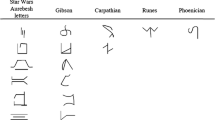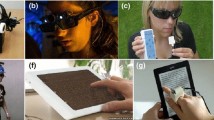Abstract
A high percentage of people with intellectual disability experience communication impairments that limit their use of spoken language and make the use of alternative and augmentative communication (AAC) devices potentially beneficial. However, AAC devices often present barriers for people with intellectual disability due to the complexity of switching between levels and overlays and by hardware configurations that limit the number of words or phrases that can be programmed into a device. This study reports on an evaluation of GeoTalk, a handheld device application that incorporates universal design in the user interface and integrates global positioning system (GPS), electronic schedule timers, and other sensor technology to automatically switch between vocabulary sets when the user enters a designated geographic zone, such as a school, bank, and grocery store. The system also triggers automated switches in vocabulary sets based upon time of day or remote sensors in situations that require a unique vocabulary set. Findings from the pilot test showed that people with intellectual disability were able to operate the GPS-enabled GeoTalk device with fewer errors, requiring fewer prompts, and with greater speed than two commercially available comparison AAC devices.







Similar content being viewed by others
References
Campbell, D. T., & Stanley, J. (1963). Experimental and quasi-experimental designs for research. Boston: Houghton Mifflin.
Davies, D. K., Stock, S. E., Holloway, S., & Wehmeyer, M. L. (2010). Evaluating a GPS-based transportation device to support independent bus travel by people with intellectual disability. Intellectual and Developmental Disabilities, 48, 454–463.
Light, J., & McNaughton, D. (2015). Designing AAC research and interventions to improve outcomes for individuals with complex communication needs. Augmentative and Alternative Communication, 31, 85–96.
McNaughton, D., & Light, J. (2013). The iPad and mobile technology revolution: benefits and challenges for individuals who require augmentative and alternative communication. Augmentative and Alternative Communication, 29, 107–116.
Mirenda, P., & Mathy-Laikko, P. (1989). Augmentative and alternative communication applications for persons with severe congenital communication disorders: an introduction. Augmentative and Alternative Communication, 5, 3–13.
Williamson, B., Aplin, T., de Jonge, D., & Goyne, M. (2017). Tracking down a solution: exploring the acceptability and value of wearable GPS devices for older persons, individuals with a disability, and their support persons. Disability and Rehabilitation. Assistive Technology, 12, 822–831.
Author information
Authors and Affiliations
Contributions
DKD and SES: designed and executed the study, assisted with the data analyses, and assisted with writing the paper. RGH: assisted with the data collection and software development. MLW: consulted on research design and assisted with writing the paper.
Corresponding author
Ethics declarations
Conflict of Interest
The authors declare that they have no conflict of interest.
Ethical Approval
All procedures performed in studies involving human participants were in accordance with the ethical standards of the institutional committee at the AbleLink Technologies and with the 1964 Helsinki declaration and its later amendments or comparable ethical standards.
Informed Consent
Informed consent was obtained from all individual participants included in the study.
Rights and permissions
About this article
Cite this article
Davies, D.K., Stock, S.E., Herold, R.G. et al. GeoTalk: a GPS-Enabled Portable Speech Output Device for People with Intellectual Disability. Adv Neurodev Disord 2, 253–261 (2018). https://doi.org/10.1007/s41252-018-0068-2
Published:
Issue Date:
DOI: https://doi.org/10.1007/s41252-018-0068-2




